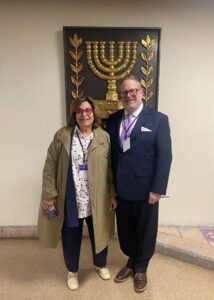Two of the Minneapolis Jewish community leaders spent a brief time in Israel this week expressing their concern about the current state of political concern and unrest.
Minneapolis Jewish Federation CEO James Cohen and former MJF President Beth Kieffer Leonard, who also served as a past chair of budget and finance for the Jewish Agency for Israel, were part of a 30-person Jewish Federations of North America delegation that made an emergency trip to Israel to lobby the government to find a compromise amidst the current controversy that threatens to weaken the judicial branch of the government.
“It went very well,” said Cohen prior to his return to Minneapolis. “We were very well received, and I think the thing that was the most encouraging was – to a person, regardless of whether they were on the right, left, center, or otherwise – they were glad we were there. And most of them expressed an interest that given the unique situation, we actually had a role and a responsibility to be there.
“Not one of the Israeli officials was of the opinion that this is purely a domestic issue.”
In a statement released Wednesday after the meetings, JFNA said: “Our communities share a deep concern for the divisions that the judicial reform debate is creating in Israel and among Jews worldwide, and we are worried that certain aspects of the proposed reforms could have a very negative impact on the relationship between our communities and Israel. We urged all the leaders we spoke with to work with President Herzog to negotiate a solution that could have broad support across Israeli society.”
The delegation was put together in a short time frame late last week.
“For being there for 24 hours, we had so many representatives (meet with us),” Leonard said. “I honestly don’t think it could have been done any better. It was really well done.”
The delegation met with President Isaac Herzog, Minister of Economy and Industry Nir Barkat, opposition leader Yair Lapid, Members of the Knesset Benny Gantz, Simcha Rothman, Danny Danon and other members of the Knesset from the coalition and opposition, as well as senior business leaders who oppose the reforms.
“I think it speaks to the genuine concern and the genuine desire to make sure that folks in Israel, regardless of their opinion, know that their brothers and sisters in North America really care,” he said.
Last month, the JFNA sent a letter to Prime Minister Benjamin Netanyahu and Opposition Leader Yair Lapid expressing their concerns over aspects of the reforms and urging the two sides to accept Herzog’s proposal.
Cohen said that nearly half of the funds MJF raises each year goes to fund programs in Israel through its overseas partners, Jewish Agency for Israel (JAFI) and the American Jewish Joint Distribution Committee (JDC).
“There are always going to be programs that the government isn’t going to fund that is important and that make a difference in the fabric,” Leonard said. “And the Jewish Agency is the only organization that can do aliyah and absorption. The government can’t do it.”
While the delegation was in Israel, the Times of Israel reported that National Security Minister Itamar Ben Gvir canceled an anti-crime initiative in several Arab towns because it was funded by the JDC, which he called a “leftist organization.”

Protesters gather in Israel after a compromise brokered by the president was shot down by the governing coalition (Photo courtesy Beth Kieffer Leonard).
“Yeah, that’s unfortunate,” Cohen said. “Because we fund the JDC and JAFI, that fuels a tremendous amount of activity for those who truly need it. The same people who are in need were in need under the last government, they’re in need in this government, and there’ll be a need in the next government. We help people. And it’s imperative that we continue to do so and that we stand by them, regardless of political stress.”
Cohen said there was no agenda other than to express concern and describe the potential damage that would be caused to American Jewry if the proposed reforms went through.
“We didn’t prescribe any specific solution other than they should listen to President Herzog and compromise,” he said.
Later in the day Thursday, it was reported that Netanyahu’s coalition rejected Herzog’s compromise plan, leading to protests. The self-inflicted nature of the controversy is what riles Leonard so much.
“If it’s rockets coming from Gaza, or it’s a terrorist attack in Jerusalem, that’s completely different,” she said. “This is the worst thing in the country that I’ve ever experienced.”


